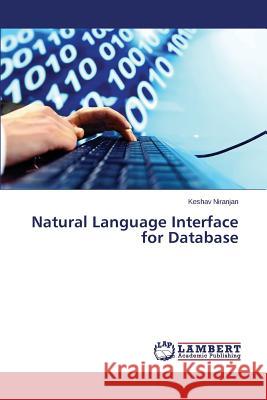Natural Language Interface for Database » książka
Natural Language Interface for Database
ISBN-13: 9783659452161 / Angielski / Miękka / 2014 / 120 str.
This book presents a paradigm for developing the Natural Language Interface (NLI) for databases. The goal is to replace the Structured Query Language (SQL) with natural language for database communication and analysis. Natural language Interface facilitates the user to ask the query in natural language and retrieves the data from the database. Natural language can be English, Hindi, Tamil, Telugu, and Bengali or any other language. Therefore, system is language neutral and user can use the system in his native language query. Learning additional SQL bring the cognitive load to the users and simple NLIs like the one proposed in this book can be viable alternatives. The proposed NLI system will consist of several modules such as Input, Tokenizer, Query Mapper, Query Builder, Query executer and Output modules. Each module is connected to the next module and gives the intermediate output as input to the next module .This paradigm has been applied to Indian languages therefore proposed system is expected to be useful to novice, nontechnical users who have difficulty in learning complicated SQL commands.
This book presents a paradigm for developing the Natural Language Interface (NLI) for databases. The goal is to replace the Structured Query Language (SQL) with natural language for database communication and analysis. Natural language Interface facilitates the user to ask the query in natural language and retrieves the data from the database. Natural language can be English, Hindi, Tamil, Telugu, and Bengali or any other language. Therefore, system is language neutral and user can use the system in his native language query. Learning additional SQL bring the cognitive load to the users and simple NLIs like the one proposed in this book can be viable alternatives. The proposed NLI system will consist of several modules such as Input, Tokenizer, Query Mapper, Query Builder, Query executer and Output modules. Each module is connected to the next module and gives the intermediate output as input to the next module .This paradigm has been applied to Indian languages therefore proposed system is expected to be useful to novice, nontechnical users who have difficulty in learning complicated SQL commands.











